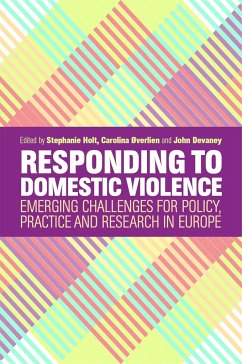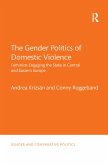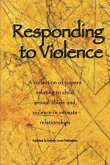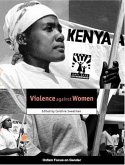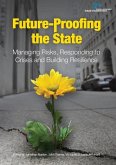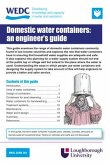Responding to Domestic Violence
Emerging Challenges for Policy, Practice and Research in Europe
Herausgeber: Holt, Stephanie; Devaney, John; Øverlien, Carolina
Responding to Domestic Violence
Emerging Challenges for Policy, Practice and Research in Europe
Herausgeber: Holt, Stephanie; Devaney, John; Øverlien, Carolina
- Broschiertes Buch
- Merkliste
- Auf die Merkliste
- Bewerten Bewerten
- Teilen
- Produkt teilen
- Produkterinnerung
- Produkterinnerung
How can our legal, health and social care systems achieve a more effective response to domestic violence? Based on new evidence, this book discusses the most effective ways to understand and tackle domestic abuse.
Andere Kunden interessierten sich auch für
![The Gender Politics of Domestic Violence The Gender Politics of Domestic Violence]() Andrea KrizsánThe Gender Politics of Domestic Violence75,99 €
Andrea KrizsánThe Gender Politics of Domestic Violence75,99 €![Responding to Violence Responding to Violence]() Responding to Violence22,99 €
Responding to Violence22,99 €![Violence Against Women Violence Against Women]() Caroline SweetmanViolence Against Women21,99 €
Caroline SweetmanViolence Against Women21,99 €![Drones, Force and Law Drones, Force and Law]() David Hastings DunnDrones, Force and Law25,99 €
David Hastings DunnDrones, Force and Law25,99 €![Future-Proofing the State Future-Proofing the State]() Future-Proofing the State30,99 €
Future-Proofing the State30,99 €![An Engineer's Guide to Domestic Water Containers An Engineer's Guide to Domestic Water Containers]() Brian ReedAn Engineer's Guide to Domestic Water Containers13,99 €
Brian ReedAn Engineer's Guide to Domestic Water Containers13,99 €![Responding to Modern Genocide Responding to Modern Genocide]() Mark D KielsgardResponding to Modern Genocide73,99 €
Mark D KielsgardResponding to Modern Genocide73,99 €-
-
-
How can our legal, health and social care systems achieve a more effective response to domestic violence? Based on new evidence, this book discusses the most effective ways to understand and tackle domestic abuse.
Hinweis: Dieser Artikel kann nur an eine deutsche Lieferadresse ausgeliefert werden.
Hinweis: Dieser Artikel kann nur an eine deutsche Lieferadresse ausgeliefert werden.
Produktdetails
- Produktdetails
- Verlag: Jessica Kingsley Publishers
- Seitenzahl: 368
- Erscheinungstermin: 21. November 2017
- Englisch
- Abmessung: 229mm x 152mm x 18mm
- Gewicht: 454g
- ISBN-13: 9781785922619
- ISBN-10: 1785922610
- Artikelnr.: 48821724
- Herstellerkennzeichnung
- Libri GmbH
- Europaallee 1
- 36244 Bad Hersfeld
- gpsr@libri.de
- Verlag: Jessica Kingsley Publishers
- Seitenzahl: 368
- Erscheinungstermin: 21. November 2017
- Englisch
- Abmessung: 229mm x 152mm x 18mm
- Gewicht: 454g
- ISBN-13: 9781785922619
- ISBN-10: 1785922610
- Artikelnr.: 48821724
- Herstellerkennzeichnung
- Libri GmbH
- Europaallee 1
- 36244 Bad Hersfeld
- gpsr@libri.de
Edited by Stephanie Holt, Carolina Øverlien and John Devaney
Introduction - Stephanie Holt
Associate Professor of Social Work
Trinity College Dublin
Ireland
Carolina Øverlien
Associate Professor
Stockholm University
Sweden and Researcher
Norwegian Center for Violence and Traumatic Stress Studies
Oslo
Norway and John Devaney
Senior Lecturer
Queen's University Belfast
United Kingdom. Part I: The policy framework for responding to domestic violence in Europe. 1. Domestic violence - a rights-based response: Drawing on results from the FRA's violence against women survey - Joanna Goodey
Head of the Freedoms and Justice Department
European Union Agency for Fundamental Rights
Vienna
Austria. 2. Development
coordination and implementation of national strategies for the prevention of domestic
sexual and gender-based violence in Ireland: Lessons learned and unlearned - Philip McCormack
Cosc - The National Office for the Prevention of Domestic
Sexual and Gender-based Violence
Dublin
Ireland. Part II: Children's experiences of domestic violence. 3. Mother-child relationships in the context of intimate partner violence - Zuzana Ocenasova
Coordination and Methodological Centre for Prevention of Violence against Women
Bratislava
Slovakia and Hana Smitkova
Department of Psychology
Comenius University
Bratislava
Slovakia. 4. Voice
agency power: A framework for young survivors' participation in national domestic abuse policy-making - Claire Houghton
Researcher and Expert Adviser
School of Social and Political Science
University of Edinburgh
United Kingdom. 5. Including children and young people in domestic violence research: When myths and misconceptions compromise participation - Carolina Øverlien
Associate Professor
Stockholm University
Sweden and Researcher
Norwegian Center for Violence and Traumatic Stress Studies
Oslo
Norway and Stephanie Holt
Associate Professor of Social Work
Trinity College Dublin
Ireland. 6. Research on teenage intimate partner violence within a European context: Findings from the literature - Sibel Korkmaz
PhD Candidate
Department of Social Work
Stockholm University
Sweden. 7. Fear of double disclosure and other barriers to the help seeking: An intersectional approach to address the needs of LGBT teenagers experiencing teenage relationship abuse -Maria Pentaraki
Lecturer in Social Work
Queen's University Belfast
United Kingdom. 8. Caring dads
safer children: Using a focus on fathering to respond to domestic violence - Nicola McConnell
Senior Evaluation Officer
NSPCC
United Kingdom
Julie Taylor
Professor of Child Protection
University of Birmingham/ Birmingham Women's and Children's NHS Foundation Trust
United Kingdom and Matt Barnard
Head of Crime
Justice and Communities
NatCen
United Kingdom. Part III: New understandings on domestic abuse and violence. 9. Strength through solidarity: Practitioners and parents resisting child to parent violence and abuse in Ireland - Declan Coogan
Lecturer in Social Work
NUI Galway
Ireland. 10. Digital intimate partner violence and abuse among youth: A systematic review of associated factors - Per Moum Hellevik
PhD Candidate
Norwegian Centre for Violence and Traumatic Stress Studies
Oslo
Norway. 11. Human trafficking and gender based violence: From life and limb to hearts and minds - Nusha Yonkova
Anti-Trafficking Manager
Immigrant Council of Ireland and Gloria Kirwan
Assistant Professor of Social Work
Trinity College Dublin
Ireland. 12. Female genital mutilation: Results from the Portuguese prevalence study - Dalila Cerejo
Interdisciplinary Centre of Social Sciences (CICSNOVA- FCSH/NOVA) New University of Lisbon
Portugal. 13. Force marriage in Europe: The case of Belgium - Els Leye
International Centre for Reproductive Health
Ghent University
Belgium. Part IV: Responding to domestic violence and abuse. 14. Models on treatment of intimate partner violence: Gender based and trauma informed work at Alternative to Violence in Norway - Ingunn Rangul Askeland
Senior Research Fellow
Norwegian Centre for Violence and Traumatic Stress Studies
and Clinical Psychologist
Alternative to Violence
Oslo
Norway and Marius Råkil
Director
Alternative to Violence
Oslo
Norway. 15. Healthcare responses to domestic violence: Why and how? - Lucy Potter
Academic Clinical Fellow
University of Bristol
United Kingdom and Gene Feder
Professor of Primary Care
University of Bristol
United Kingdom. 16. Older women's experiences of domestic abuse - Elizabeth Martin
PhD Candidate
Queen's University Belfast
United Kingdom
John Devaney
Senior Lecturer in Social Work
Queen's University Belfast
United Kingdom and Gemma Carney
Lecturer in Social Policy
Queen's University Belfast
United Kingdom. 17. Whose movement is it anyway? Reflections from the field - Davina James-Hanman
Independent Violence Against Women Consultant
Lisbon
Portugal. Conclusion: Progressing the debate on domestic violence in Europe - Stephanie Holt
Associate Professor of Social Work
Trinity College Dublin
Ireland
John Devaney
Senior Lecturer
Queen's University Belfast
United Kingdom and Carolina Øverlien
Associate Professor
Stockholm University
Swedenand Researcher
Norwegian Center for Violence and Traumatic Stress Studies
Oslo
Norway.
Associate Professor of Social Work
Trinity College Dublin
Ireland
Carolina Øverlien
Associate Professor
Stockholm University
Sweden and Researcher
Norwegian Center for Violence and Traumatic Stress Studies
Oslo
Norway and John Devaney
Senior Lecturer
Queen's University Belfast
United Kingdom. Part I: The policy framework for responding to domestic violence in Europe. 1. Domestic violence - a rights-based response: Drawing on results from the FRA's violence against women survey - Joanna Goodey
Head of the Freedoms and Justice Department
European Union Agency for Fundamental Rights
Vienna
Austria. 2. Development
coordination and implementation of national strategies for the prevention of domestic
sexual and gender-based violence in Ireland: Lessons learned and unlearned - Philip McCormack
Cosc - The National Office for the Prevention of Domestic
Sexual and Gender-based Violence
Dublin
Ireland. Part II: Children's experiences of domestic violence. 3. Mother-child relationships in the context of intimate partner violence - Zuzana Ocenasova
Coordination and Methodological Centre for Prevention of Violence against Women
Bratislava
Slovakia and Hana Smitkova
Department of Psychology
Comenius University
Bratislava
Slovakia. 4. Voice
agency power: A framework for young survivors' participation in national domestic abuse policy-making - Claire Houghton
Researcher and Expert Adviser
School of Social and Political Science
University of Edinburgh
United Kingdom. 5. Including children and young people in domestic violence research: When myths and misconceptions compromise participation - Carolina Øverlien
Associate Professor
Stockholm University
Sweden and Researcher
Norwegian Center for Violence and Traumatic Stress Studies
Oslo
Norway and Stephanie Holt
Associate Professor of Social Work
Trinity College Dublin
Ireland. 6. Research on teenage intimate partner violence within a European context: Findings from the literature - Sibel Korkmaz
PhD Candidate
Department of Social Work
Stockholm University
Sweden. 7. Fear of double disclosure and other barriers to the help seeking: An intersectional approach to address the needs of LGBT teenagers experiencing teenage relationship abuse -Maria Pentaraki
Lecturer in Social Work
Queen's University Belfast
United Kingdom. 8. Caring dads
safer children: Using a focus on fathering to respond to domestic violence - Nicola McConnell
Senior Evaluation Officer
NSPCC
United Kingdom
Julie Taylor
Professor of Child Protection
University of Birmingham/ Birmingham Women's and Children's NHS Foundation Trust
United Kingdom and Matt Barnard
Head of Crime
Justice and Communities
NatCen
United Kingdom. Part III: New understandings on domestic abuse and violence. 9. Strength through solidarity: Practitioners and parents resisting child to parent violence and abuse in Ireland - Declan Coogan
Lecturer in Social Work
NUI Galway
Ireland. 10. Digital intimate partner violence and abuse among youth: A systematic review of associated factors - Per Moum Hellevik
PhD Candidate
Norwegian Centre for Violence and Traumatic Stress Studies
Oslo
Norway. 11. Human trafficking and gender based violence: From life and limb to hearts and minds - Nusha Yonkova
Anti-Trafficking Manager
Immigrant Council of Ireland and Gloria Kirwan
Assistant Professor of Social Work
Trinity College Dublin
Ireland. 12. Female genital mutilation: Results from the Portuguese prevalence study - Dalila Cerejo
Interdisciplinary Centre of Social Sciences (CICSNOVA- FCSH/NOVA) New University of Lisbon
Portugal. 13. Force marriage in Europe: The case of Belgium - Els Leye
International Centre for Reproductive Health
Ghent University
Belgium. Part IV: Responding to domestic violence and abuse. 14. Models on treatment of intimate partner violence: Gender based and trauma informed work at Alternative to Violence in Norway - Ingunn Rangul Askeland
Senior Research Fellow
Norwegian Centre for Violence and Traumatic Stress Studies
and Clinical Psychologist
Alternative to Violence
Oslo
Norway and Marius Råkil
Director
Alternative to Violence
Oslo
Norway. 15. Healthcare responses to domestic violence: Why and how? - Lucy Potter
Academic Clinical Fellow
University of Bristol
United Kingdom and Gene Feder
Professor of Primary Care
University of Bristol
United Kingdom. 16. Older women's experiences of domestic abuse - Elizabeth Martin
PhD Candidate
Queen's University Belfast
United Kingdom
John Devaney
Senior Lecturer in Social Work
Queen's University Belfast
United Kingdom and Gemma Carney
Lecturer in Social Policy
Queen's University Belfast
United Kingdom. 17. Whose movement is it anyway? Reflections from the field - Davina James-Hanman
Independent Violence Against Women Consultant
Lisbon
Portugal. Conclusion: Progressing the debate on domestic violence in Europe - Stephanie Holt
Associate Professor of Social Work
Trinity College Dublin
Ireland
John Devaney
Senior Lecturer
Queen's University Belfast
United Kingdom and Carolina Øverlien
Associate Professor
Stockholm University
Swedenand Researcher
Norwegian Center for Violence and Traumatic Stress Studies
Oslo
Norway.
Introduction - Stephanie Holt
Associate Professor of Social Work
Trinity College Dublin
Ireland
Carolina Øverlien
Associate Professor
Stockholm University
Sweden and Researcher
Norwegian Center for Violence and Traumatic Stress Studies
Oslo
Norway and John Devaney
Senior Lecturer
Queen's University Belfast
United Kingdom. Part I: The policy framework for responding to domestic violence in Europe. 1. Domestic violence - a rights-based response: Drawing on results from the FRA's violence against women survey - Joanna Goodey
Head of the Freedoms and Justice Department
European Union Agency for Fundamental Rights
Vienna
Austria. 2. Development
coordination and implementation of national strategies for the prevention of domestic
sexual and gender-based violence in Ireland: Lessons learned and unlearned - Philip McCormack
Cosc - The National Office for the Prevention of Domestic
Sexual and Gender-based Violence
Dublin
Ireland. Part II: Children's experiences of domestic violence. 3. Mother-child relationships in the context of intimate partner violence - Zuzana Ocenasova
Coordination and Methodological Centre for Prevention of Violence against Women
Bratislava
Slovakia and Hana Smitkova
Department of Psychology
Comenius University
Bratislava
Slovakia. 4. Voice
agency power: A framework for young survivors' participation in national domestic abuse policy-making - Claire Houghton
Researcher and Expert Adviser
School of Social and Political Science
University of Edinburgh
United Kingdom. 5. Including children and young people in domestic violence research: When myths and misconceptions compromise participation - Carolina Øverlien
Associate Professor
Stockholm University
Sweden and Researcher
Norwegian Center for Violence and Traumatic Stress Studies
Oslo
Norway and Stephanie Holt
Associate Professor of Social Work
Trinity College Dublin
Ireland. 6. Research on teenage intimate partner violence within a European context: Findings from the literature - Sibel Korkmaz
PhD Candidate
Department of Social Work
Stockholm University
Sweden. 7. Fear of double disclosure and other barriers to the help seeking: An intersectional approach to address the needs of LGBT teenagers experiencing teenage relationship abuse -Maria Pentaraki
Lecturer in Social Work
Queen's University Belfast
United Kingdom. 8. Caring dads
safer children: Using a focus on fathering to respond to domestic violence - Nicola McConnell
Senior Evaluation Officer
NSPCC
United Kingdom
Julie Taylor
Professor of Child Protection
University of Birmingham/ Birmingham Women's and Children's NHS Foundation Trust
United Kingdom and Matt Barnard
Head of Crime
Justice and Communities
NatCen
United Kingdom. Part III: New understandings on domestic abuse and violence. 9. Strength through solidarity: Practitioners and parents resisting child to parent violence and abuse in Ireland - Declan Coogan
Lecturer in Social Work
NUI Galway
Ireland. 10. Digital intimate partner violence and abuse among youth: A systematic review of associated factors - Per Moum Hellevik
PhD Candidate
Norwegian Centre for Violence and Traumatic Stress Studies
Oslo
Norway. 11. Human trafficking and gender based violence: From life and limb to hearts and minds - Nusha Yonkova
Anti-Trafficking Manager
Immigrant Council of Ireland and Gloria Kirwan
Assistant Professor of Social Work
Trinity College Dublin
Ireland. 12. Female genital mutilation: Results from the Portuguese prevalence study - Dalila Cerejo
Interdisciplinary Centre of Social Sciences (CICSNOVA- FCSH/NOVA) New University of Lisbon
Portugal. 13. Force marriage in Europe: The case of Belgium - Els Leye
International Centre for Reproductive Health
Ghent University
Belgium. Part IV: Responding to domestic violence and abuse. 14. Models on treatment of intimate partner violence: Gender based and trauma informed work at Alternative to Violence in Norway - Ingunn Rangul Askeland
Senior Research Fellow
Norwegian Centre for Violence and Traumatic Stress Studies
and Clinical Psychologist
Alternative to Violence
Oslo
Norway and Marius Råkil
Director
Alternative to Violence
Oslo
Norway. 15. Healthcare responses to domestic violence: Why and how? - Lucy Potter
Academic Clinical Fellow
University of Bristol
United Kingdom and Gene Feder
Professor of Primary Care
University of Bristol
United Kingdom. 16. Older women's experiences of domestic abuse - Elizabeth Martin
PhD Candidate
Queen's University Belfast
United Kingdom
John Devaney
Senior Lecturer in Social Work
Queen's University Belfast
United Kingdom and Gemma Carney
Lecturer in Social Policy
Queen's University Belfast
United Kingdom. 17. Whose movement is it anyway? Reflections from the field - Davina James-Hanman
Independent Violence Against Women Consultant
Lisbon
Portugal. Conclusion: Progressing the debate on domestic violence in Europe - Stephanie Holt
Associate Professor of Social Work
Trinity College Dublin
Ireland
John Devaney
Senior Lecturer
Queen's University Belfast
United Kingdom and Carolina Øverlien
Associate Professor
Stockholm University
Swedenand Researcher
Norwegian Center for Violence and Traumatic Stress Studies
Oslo
Norway.
Associate Professor of Social Work
Trinity College Dublin
Ireland
Carolina Øverlien
Associate Professor
Stockholm University
Sweden and Researcher
Norwegian Center for Violence and Traumatic Stress Studies
Oslo
Norway and John Devaney
Senior Lecturer
Queen's University Belfast
United Kingdom. Part I: The policy framework for responding to domestic violence in Europe. 1. Domestic violence - a rights-based response: Drawing on results from the FRA's violence against women survey - Joanna Goodey
Head of the Freedoms and Justice Department
European Union Agency for Fundamental Rights
Vienna
Austria. 2. Development
coordination and implementation of national strategies for the prevention of domestic
sexual and gender-based violence in Ireland: Lessons learned and unlearned - Philip McCormack
Cosc - The National Office for the Prevention of Domestic
Sexual and Gender-based Violence
Dublin
Ireland. Part II: Children's experiences of domestic violence. 3. Mother-child relationships in the context of intimate partner violence - Zuzana Ocenasova
Coordination and Methodological Centre for Prevention of Violence against Women
Bratislava
Slovakia and Hana Smitkova
Department of Psychology
Comenius University
Bratislava
Slovakia. 4. Voice
agency power: A framework for young survivors' participation in national domestic abuse policy-making - Claire Houghton
Researcher and Expert Adviser
School of Social and Political Science
University of Edinburgh
United Kingdom. 5. Including children and young people in domestic violence research: When myths and misconceptions compromise participation - Carolina Øverlien
Associate Professor
Stockholm University
Sweden and Researcher
Norwegian Center for Violence and Traumatic Stress Studies
Oslo
Norway and Stephanie Holt
Associate Professor of Social Work
Trinity College Dublin
Ireland. 6. Research on teenage intimate partner violence within a European context: Findings from the literature - Sibel Korkmaz
PhD Candidate
Department of Social Work
Stockholm University
Sweden. 7. Fear of double disclosure and other barriers to the help seeking: An intersectional approach to address the needs of LGBT teenagers experiencing teenage relationship abuse -Maria Pentaraki
Lecturer in Social Work
Queen's University Belfast
United Kingdom. 8. Caring dads
safer children: Using a focus on fathering to respond to domestic violence - Nicola McConnell
Senior Evaluation Officer
NSPCC
United Kingdom
Julie Taylor
Professor of Child Protection
University of Birmingham/ Birmingham Women's and Children's NHS Foundation Trust
United Kingdom and Matt Barnard
Head of Crime
Justice and Communities
NatCen
United Kingdom. Part III: New understandings on domestic abuse and violence. 9. Strength through solidarity: Practitioners and parents resisting child to parent violence and abuse in Ireland - Declan Coogan
Lecturer in Social Work
NUI Galway
Ireland. 10. Digital intimate partner violence and abuse among youth: A systematic review of associated factors - Per Moum Hellevik
PhD Candidate
Norwegian Centre for Violence and Traumatic Stress Studies
Oslo
Norway. 11. Human trafficking and gender based violence: From life and limb to hearts and minds - Nusha Yonkova
Anti-Trafficking Manager
Immigrant Council of Ireland and Gloria Kirwan
Assistant Professor of Social Work
Trinity College Dublin
Ireland. 12. Female genital mutilation: Results from the Portuguese prevalence study - Dalila Cerejo
Interdisciplinary Centre of Social Sciences (CICSNOVA- FCSH/NOVA) New University of Lisbon
Portugal. 13. Force marriage in Europe: The case of Belgium - Els Leye
International Centre for Reproductive Health
Ghent University
Belgium. Part IV: Responding to domestic violence and abuse. 14. Models on treatment of intimate partner violence: Gender based and trauma informed work at Alternative to Violence in Norway - Ingunn Rangul Askeland
Senior Research Fellow
Norwegian Centre for Violence and Traumatic Stress Studies
and Clinical Psychologist
Alternative to Violence
Oslo
Norway and Marius Råkil
Director
Alternative to Violence
Oslo
Norway. 15. Healthcare responses to domestic violence: Why and how? - Lucy Potter
Academic Clinical Fellow
University of Bristol
United Kingdom and Gene Feder
Professor of Primary Care
University of Bristol
United Kingdom. 16. Older women's experiences of domestic abuse - Elizabeth Martin
PhD Candidate
Queen's University Belfast
United Kingdom
John Devaney
Senior Lecturer in Social Work
Queen's University Belfast
United Kingdom and Gemma Carney
Lecturer in Social Policy
Queen's University Belfast
United Kingdom. 17. Whose movement is it anyway? Reflections from the field - Davina James-Hanman
Independent Violence Against Women Consultant
Lisbon
Portugal. Conclusion: Progressing the debate on domestic violence in Europe - Stephanie Holt
Associate Professor of Social Work
Trinity College Dublin
Ireland
John Devaney
Senior Lecturer
Queen's University Belfast
United Kingdom and Carolina Øverlien
Associate Professor
Stockholm University
Swedenand Researcher
Norwegian Center for Violence and Traumatic Stress Studies
Oslo
Norway.

